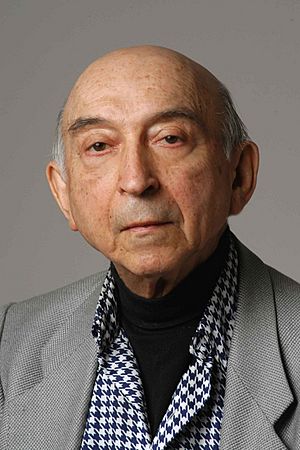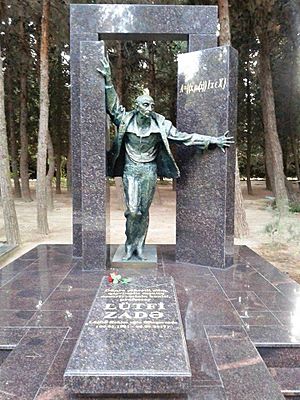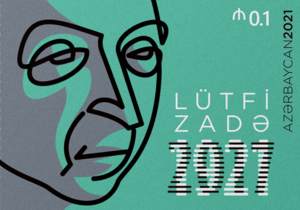Lotfi A. Zadeh facts for kids
Quick facts for kids
Lotfi A. Zadeh
|
|
|---|---|
|
|

(2016)
|
|
| Born |
Lotfi Aliaskerzadeh
4 February 1921 |
| Died | 6 September 2017 (aged 96) |
| Alma mater |
|
| Known for | Founder of fuzzy mathematics, fuzzy set theory, and fuzzy logic, Z numbers, Z-transform |
| Spouse(s) | Fay Zadeh |
| Children | 2, including Norman Zada |
| Awards | Eringen Medal (1976) IEEE Hamming Medal (1992) Rufus Oldenburger Medal (1993) IEEE Medal of Honor (1995) 2012 BBVA Foundation Frontiers of Knowledge Award Honorary Doctorate of Tehran University (2016) ACM Fellow IEEE Fellow AAAS Fellow AAAI Fellow Member of the National Academy of Engineering Founding Member of Eurasian Academy |
| Scientific career | |
| Fields | |
| Institutions | University of California, Berkeley |
| Thesis | Frequency analysis of variable networks (1949) |
| Doctoral advisor | John R. Ragazzini |
| Doctoral students |
|
Lotfi Aliasker Zadeh (born Lotfi Aliaskerzadeh; February 4, 1921 – September 6, 2017) was a brilliant scientist. He was a mathematician, computer scientist, and electrical engineer. He also taught computer science at the University of California, Berkeley.
Zadeh is famous for creating "fuzzy mathematics." This includes ideas like fuzzy sets and fuzzy logic. These ideas help computers think more like humans. He was also a founding member of the Eurasian Academy.
Contents
Lotfi Zadeh's Early Life and Career
Growing Up in Azerbaijan and Iran
Lotfi Zadeh was born in Baku, Azerbaijan. His father was a journalist from Iran, and his mother was a doctor from Ukraine. The family lived well in Baku. Lotfi went to elementary school there for three years. He said this time greatly shaped how he thought.
In 1931, when Lotfi was ten, his family moved to Tehran, Iran. He attended Alborz High School, a missionary school. He spent eight years there and met his future wife, Fay. Lotfi was very impressed by the kind American teachers at the school. He said they made him want to live in the United States. During this time, he even earned some patents for his inventions.
Lotfi did very well in school. He ranked third in the national university exams. In 1942, he graduated from the University of Tehran with a degree in electrical engineering. This was during World War II, when many countries were involved in Iran. Lotfi helped his father, who supplied materials to American soldiers.
Moving to the United States
In 1943, Zadeh decided to move to the United States to continue his studies. After some delays, he arrived in 1944. He started as a graduate student at the Massachusetts Institute of Technology (MIT) in September. In the U.S., he shortened his last name to Zadeh. He earned his master's degree in electrical engineering from MIT in 1946.
In 1947, Zadeh moved to New York City. He worked as an engineer at Columbia University. He then became a doctoral student and a teacher there. In 1949, he earned his PhD (a very high degree) in electrical engineering from Columbia. He taught at Columbia for ten years and became a full professor in 1957.
In 1959, Zadeh joined the Electrical Engineering faculty at the University of California, Berkeley. He made important scientific contributions in two main areas. First, he worked on how to control systems, like machines or processes. Second, and more famously, he developed fuzzy sets and fuzzy logic.
In 1967, Zadeh received a Guggenheim Fellowship. This is a special award for people doing important research.
Understanding Fuzzy Logic
Zadeh's most famous work is about "fuzzy sets" and "fuzzy logic." He published his main ideas on fuzzy sets in 1965. He wanted to make computers think more like humans. Humans often deal with ideas that aren't perfectly clear, like "tall" or "cold." Fuzzy logic helps computers understand these "fuzzy" ideas.
In 1973, he introduced his theory of fuzzy logic. Fuzzy sets and fuzzy logic are the basis for many new technologies. Here are some examples:
- Fuzzy control: This uses fuzzy logic to control machines. It uses "if-then" rules, like "if the room is a little warm, then turn the fan on a little."
- Fuzzy pattern recognition: This helps computers recognize patterns using fuzzy ideas. For example, it can group similar things even if they don't exactly match.
- Fuzzy database: This allows databases to handle information that isn't perfectly exact.
- Fuzzy mathematics: This is a way to do math using fuzzy sets and fuzzy logic.
- Neuro-fuzzy systems: This combines fuzzy logic with neural networks. Neural networks are like computer brains that learn. This combination helps create smart computer systems that can explain how they make decisions.
Impact on Education
In 1963, Zadeh became the head of the Electrical Engineering Department at the University of California, Berkeley. He made a big change by adding computer science to the department. In 1968, it became the Department of Electrical Engineering and Computer Science (EECS). This helped UC Berkeley become a top school for computer science. Many other universities around the world followed his lead.
In 1973, Lotfi Zadeh received the IEEE Education Award. This was for his great work as a department head. He also guided more than 50 students who were getting their PhDs. Many of these students became leaders in engineering and science.
Personal Life and Beliefs
Zadeh enjoyed taking pictures of people. He didn't focus on where he came from. He said, "The question really isn't whether I'm American, Russian, Iranian, Azerbaijani, or anything else. I've been shaped by all these people and cultures." He also said that being stubborn helped him develop fuzzy logic. He called himself "an American, mathematically oriented, electrical engineer of Iranian descent, born in Russia."
He and his wife, Fay Zadeh, had two children, Stella and Norman Zada. Fay wrote a book about their travels and experiences together.
Lotfi Zadeh passed away at his home in Berkeley, California, on September 6, 2017. He was 96 years old. He was buried in Baku, Azerbaijan, the city where he was born. Many respected people attended his funeral.
Lotfi Zadeh's Work and Legacy
Lotfi Zadeh's work has been cited (mentioned) by other scientists hundreds of thousands of times. His 1965 paper on "Fuzzy sets" is especially famous.
Fuzzy Sets and AI
In his theory of fuzzy sets, Zadeh suggested using a "membership function." This function gives a value between 0 and 1 to show how much something belongs to a set. For example, a person might be "0.8 tall" if they are quite tall but not extremely tall. This is different from traditional logic, where something is either "true" (1) or "false" (0).
Fuzzy logic helps computers understand ideas that have unclear boundaries. For example, a computer can understand "John is somewhat bold." This is more natural for humans than saying "John's boldness level is 0.5."
Zadeh was also active in the AI community. He attended the famous Dartmouth Workshop where the term "artificial intelligence" was first used.
Other Important Contributions
Zadeh also helped develop the Z-transform method in 1952. This method is important for understanding and controlling digital systems, like those used in computers and electronics. He also worked on "computing with words and perceptions," which helps computers understand human language better.
Awards and Honors

Zadeh was a member of many important scientific groups, including the Institute of Electrical and Electronics Engineers and the National Academy of Engineering. He received 24 honorary doctorates, which are special degrees given to honor great achievements.
Some of his many awards include:
- IEEE Education Medal (1973)
- Eringen Medal (1976)
- IEEE Richard W. Hamming Medal (1992), for his work on fuzzy sets.
- IEEE Medal of Honor (1995), for creating fuzzy logic.
- Benjamin Franklin Medal in Electrical Engineering (2009), for inventing fuzzy logic.
- Golden Goose Award (2017), for fuzzy logic.
Zadeh's Lasting Legacy
In 2014, a special award was created in Zadeh's honor: the "Lotfi A. Zadeh Pioneer Award." This award recognizes people who have made amazing and groundbreaking contributions in systems science and engineering.
In 2019, ADA University in Baku, Azerbaijan started the "Lotfi Zadeh Scholarships." These scholarships help undergraduate students who do very well in computer science and engineering.
On February 4, 2021, scientists around the world celebrated the 100th anniversary of Zadeh's birth. On November 30, 2021, Google honored Zadeh with a special Google Doodle. This was on the anniversary of his famous paper "Fuzzy sets" being submitted for publication in 1964.
Images for kids
-
Grave of Lotfi A. Zadeh in Baku.
See also
 In Spanish: Lotfi A. Zadeh para niños
In Spanish: Lotfi A. Zadeh para niños
- Concept of Stratification





